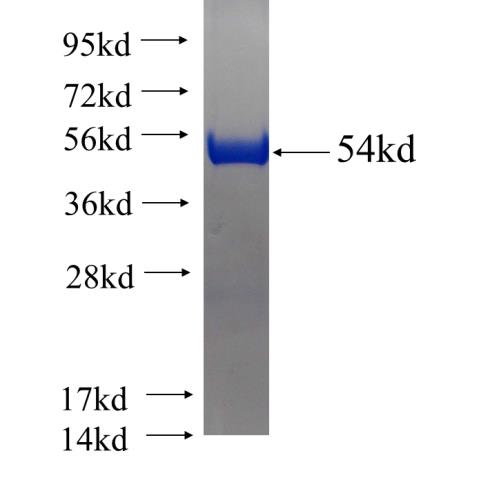-
Product Name
Human PSMA7 Recombinant protein (GST tag & His tag)
- Documents
-
Description
The proteasome is a multicatalytic proteinase complex which is characterized by its ability to cleave peptides with Arg, Phe, Tyr, Leu, and Glu adjacent to the leaving group at neutral or slightly basic pH. The proteasome has an ATP-dependent proteolytic activity. Plays an important role in the regulation of cell proliferation or cell cycle control, transcriptional regulation, immune and stress response, cell differentiation, and apoptosis. Interacts with some important proteins involved in transcription factor regulation, cell cycle transition, viral replication and even tumor initiation and progression. Inhibits the transactivation function of HIF-1A under both normoxic and hypoxia-mimicking conditions. The interaction with EMAP2 increases the proteasome-mediated HIF-1A degradation under the hypoxic conditions. Plays a role in hepatitis C virus internal ribosome entry site-mediated translation. Mediates nuclear translocation of the androgen receptor (AR) and thereby enhances androgen-mediated transactivation. Promotes MAVS degradation and thereby negatively regulates MAVS-mediated innate immune response. {PubMed:11389899, PubMed:11713272, PubMed:12119296, PubMed:19442227, PubMed:19734229}.
-
Protein name
Proteasome subunit alpha type-7
-
Protein short names
HSPC
-
Uniprot ID
O14818
-
Gene Name
PSMA7; HSPC
-
Source/Expression Host
E. coli
-
Expression Plasmid/cDNA
A DNA sequence encoding the human PSMA7 (NP_002783.1) 1-248 aa was fused with the N-terminal GST tag and C-terminal 6His tag
-
Protein Species
Human
-
Activity
Not tested.
-
Validations

Recombinant human PSMA7 SDS-PAGE
Related Products / Services
Please note: All products are "FOR RESEARCH USE ONLY AND ARE NOT INTENDED FOR DIAGNOSTIC OR THERAPEUTIC USE"
